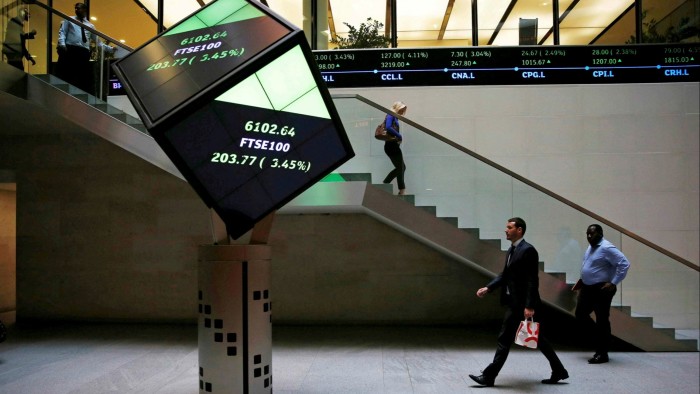Unlock the Editor’s Digest for free
Roula Khalaf, Editor of the FT, selects her favourite stories in this weekly newsletter.
Big London-listed companies are pushing to capitalise on a “change in tone” from investors by boosting their top executives’ pay as part of a transatlantic remuneration war.
Several of the FTSE’s largest companies have been emboldened by London Stock Exchange Group and Smith & Nephew’s success last year in securing shareholders’ agreement for multimillion-pound pay rises for their top executives, according to investors and boardroom advisers.
British American Tobacco and Compass Group — two of the 15 biggest companies on the London Stock Exchange by market capitalisation — are among those proposing to offer their chief executives improved pay deals this year.
“We will see more pay changes this year and next,” said Mitul Shah, head of Deloitte’s unit that advises on executive pay.
Separately, the UK’s abolition of the EU bonus cap has prompted large banks including Barclays, HSBC and Standard Chartered to ask shareholders to approve changes that would increase the maximum payouts to their chief executives if all targets are met.
Lobbying for higher pay was prevalent among companies with large US divisions and those seeking to hire from America or to retain executives who have the option of moving to transatlantic rivals, according to advisers on executive pay.
“There’s an increasing recognition that global businesses in the FTSE 100, with global peers, need to compete on pay for talented executives,” said Ambrose Faulks, co-manager of the Artemis UK Select fund.
Median FTSE 100 CEO pay, excluding pension, stands at £4.2mn, according to the High Pay Centre think-tank — 113 times the median full-time worker’s pay but far short of the roughly $16mn equivalent on the US S&P 500 index.
Prominent city figures such as London Stock Exchange boss Dame Julia Hoggett have argued that UK executives should be paid more if Britain was to retain talent, boost its competitiveness and prevent public companies from moving their listings overseas.
There had been a “change in tone” from investors who previously railed against US-style pay packages in the UK, said Richard Belfield at Willis Towers Watson, an adviser to boards on their pay structures. “The debate around this issue [last year] did open the eyes of proxy agencies and investors who didn’t want to previously engage.”
The push for higher pay was concentrated in the FTSE’s 50 largest companies with an international focus rather than for all London-listed groups, he added.
Investors and advisers said companies were also facing pressure to pay more in the next tier of roles below chief executive to attract and retain talent.
Pay competitiveness “is an issue that extends beyond the CEO level and appears to be driving up pay throughout organisations”, said Sophie Johnson, head of governance and voting at Royal London Asset Management.
While the pay of top executives who sit on the board must be disclosed in annual reports, there has been less scrutiny on the remuneration of the next rung of managers, making it less controversial to increase their salaries and bonuses.
James Harris, an executive compensation adviser at consultancy Alvarez & Marsal, said this was in turn leading to “pay compression” in companies’ top ranks.
This was motivating boards to push for pay rises for their chief executives and chief financial officers because managers reporting directly to these leaders “are bumping up against them or above them”, said Harris, leaving many companies with “an internal consistency problem”.
The Investment Association softened its stance on executive pay last year, giving companies greater leeway to tailor remuneration to their own circumstances. In return, investors are demanding disclosure on how companies benchmark their leaders’ pay against peers at other groups.
Among those set to benefit is Tadeu Marroco, BAT’s chief executive, who was paid almost £6mn in total remuneration in 2024 and could receive up to £18.2mn a year under a new pay deal. The company said in its annual report that one-third of its senior hires over the past three years had been from the US and that it had “an elevated vacancy rate across senior management levels, with lengthening times to hire”.
Compass Group’s chief executive Dominic Blakemore, who was paid nearly £9.5mn last year, could receive a maximum payout of £15.3mn under the catering company’s 2025 remuneration policy. Its chief financial officer and chief operating officer are also in line for bigger payouts.
https://www.ft.com/content/ef5c0907-6a01-41bc-ba04-1547fc093037


